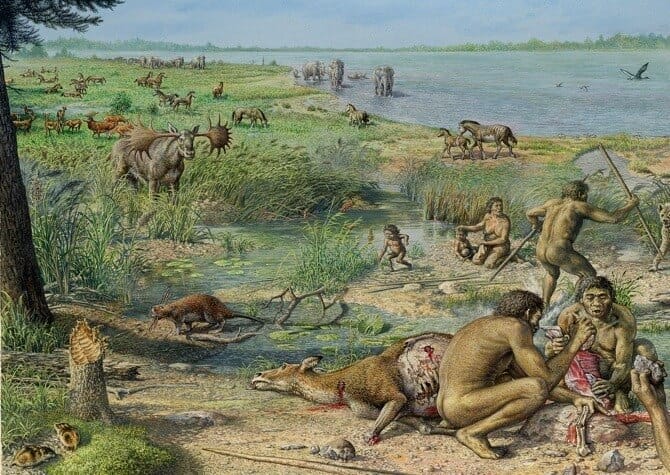The Last Ice Age
If you look at the image you notice that most of the Western World are under quite a few feet of ice. It means that no one lived there. No one could live there.
Humankind lived in the warmer regions; primarily East Africa. Although there were migrations north and west and east, often
humankind had to remigrate when the climate became too hostile.
Considering approximately 3 Million years of humanoid existence on Earth, it is only in the last 30 thousand years some form of civilisation existed.
Climate has a lot to do with civilisation.

The End of the Ice Age
As the ice began to melt, about 12,000 years ago, people began to move North.
At the time, Great Britain was not an island, it was peninsular. People could walk from what is today France to what is today England.
People moved back and forth following the animals they hunted for food.
As the ice continued to melt, sea levels rose, but slowly, nothing to frighten anyone. The Earth was getting warmer, but slowly. What had been thick sheets of ice was now marshland. What had been tundra was becoming fertile soil
The Norway Connection
The ice melted all over the Northern Hemisphere. In some places, this was nothing to be concerned about. In Norway, it caused an enormous landslide.
This displacement caused one of the greatest tsunamis on Earth.
Huge waves came racing across the North sea to slam against the Peninsula. Water raced from the East forty kilometres inland and shoved through the marshland, creating a deep channel, severing the peninsular.
The Deluge
The flood would have lasted several months. At its peak, one million cubic metres of water flowed into what would become the English Channel. Every second, a thousand times more water than plunges down the Victoria Falls raced from the East to the West.
The megaflood changed the local geography. The floodwater, racing through the marshland permanently separated what would become the United Kingdom from continental Europe?
Those who were on the peninsula must have been terrified, seeing
the racing water. They must have raced northwards as the water was rising. Getting as far from this racing flood water was survival and those who were in the South ran as fast as they could for as long as they could to escape.
For months people kept migrating North until they could not see the water. Many must have waited, assuming the water would cease, retreat and they could return home.
The current was very powerful, so even if rafts had been tried they would have gone far out to the North sea…maybe hitting upon Greenland before the travellers died, that is, if the Rafts held together.
Realising they were stuck, at least for now, the people built more permanent homes, and although many might have considered return this was delayed for many years.
Considering how short the life span, France might have become a fantasy, a place that didn’t exist in their world. For the next few thousand years, England developed independently of Europe.
They developed their languages, their religion and culture.
